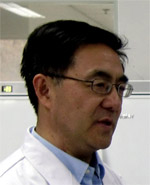

Researcher published article using others' data without their permission
China's leading AIDS scientist has come under fire for gross ethical misconduct after colleagues complained he used their unpublished data in an academic article without permission.
|
 Shao Yiming is director of virology and immunology at the National Center for AIDS and Sexually Transmitted Disease Control and Prevention. |
Shao Yiming's piece, Antiretroviral Therapy to Prevent HIV Transmission in Serodiscordant Couples in China, was published on The Lancet medical journal's website on Dec 1.
However, when it appeared in print on Oct 5, it had an additional 19 authors.
The National Center for AIDS and Sexually Transmitted Disease Control and Prevention, where Shao is director of virology and immunology, confirmed in a statement this week that the first article had failed to credit the people who indeed designed the study and collected the source data.
Shao is also a member of the National Committee of the Chinese People's Political Consultative Conference, the top political advisory body.
The Lancet noted the corrections, adding that author affiliations, correspondence details, contributors' statements and acknowledgments had also been updated.
Shao, the corresponding author, had accessed data on the AIDS epidemic surveillance system that was held at the center and published the analysis without approval, the center said on Tuesday.
"He neither gave credit to the researchers who toiled on the study nor followed the rules and procedures for publishing academic papers," the center said.
"As the main party responsible for the controversy, Shao should be criticized and a solution based on mutual compromise and communication has been made," it added, primarily referring to the updated list of authors.
Among the names added was Liu Zhongfu, the center's deputy director. He said people in the epidemic prevention and treatment divisions mainly did the research, carried out at sites around the country.
"Shao seldom presides or takes part in that part of the work," he said. "He and his team mainly do data analysis."
Liu blamed a lack of internal communication for the controversy.
In a phone interview from the United States in mid-October, Shao said that as the national center's chief AIDS scientist his work covers most areas.
Shao also branded the report "old news", and although he conceded names had been added to the print version, he said: "It makes little sense to focus on this point."
Discontent remains
Although the center said the aggrieved researchers had accepted a solution after a heated discussion, not everyone was happy.
Sun Jiangping, another deputy director of the center, and Zhao Yan, a senior specialist in AIDS treatment and care, expressed their dissatisfaction.
"I was astonished at The Lancet's handling of the issue," Zhao said, adding the journal had simply republished the piece without questioning its quality and accuracy.
"In truth, I don't want my name on the article, it lacks respect and is not scientifically correct," she said, explaining that to ensure accuracy data analysis should be done by the people who participate in the study.
Shao's background is mainly in HIV and AIDS vaccine development, she added.
Since the controversy, the National Center for AIDS and STD Control and Prevention has invited Qiu Renzong, a leading bio-ethicist with the Chinese Academy of Social Sciences, to give its staff members a lecture on ethics.
Qiu described what Shao did as plagiarism and said, "If this happened in the US, this would be a scandal, as he used other people's findings without their consent."
Qiu criticized what he called the handling of the case, and urged the center to improve its data management.
"The price for the offense was too small to deter potential offenders," he said.
Jia Zhongwei, who appeared as a first author on both versions of the article, said she was invited by Shao to analyze the source data.
However, she works at Peking University's National Institute of Drug Dependence rather than the center.
She declined to answer whether she took part in the data collection, only saying that it was from a database owned by China. "Why can't we use that for scientific research?" she added.
The Lancet article was based on a study of serodiscordant couples — of opposite sex with one HIV-positive and the other uninfected — which had been added to the national epidemiology and treatment database between 2003 and 2011.
"Our research team analyzed information of more than 38,000 couples and some of them were followed for up to nine years," Shao was quoted as saying by Health News, a newspaper affiliated with the National Health and Family Planning Commission, in December.
The study found early anti-retroviral therapy could lower HIV transmission rates by 26 percent, the paper reported.
Journalist Zheng Lingqiao, who wrote the story, said Shao, an old acquaintance, had informed her The Lancet had published his study online.
"He's such a famous scientist, and a top political adviser. I never doubted the credibility," she said.
However, other studies have come up with different results for antiretroviral therapy than reported in Shao's article.
In August 2011, a global study published by the New England Journal of Medicine said early antiretroviral therapy can reduce rates of sexual transmission of HIV among serodiscordant couples by 96 percent.
Similar studies by researchers from the China center indicated rates of 64 and 67 percent.
shanjuan@chinadaily.com.cn